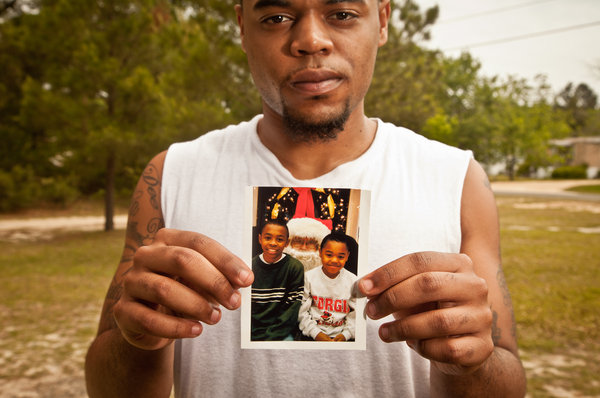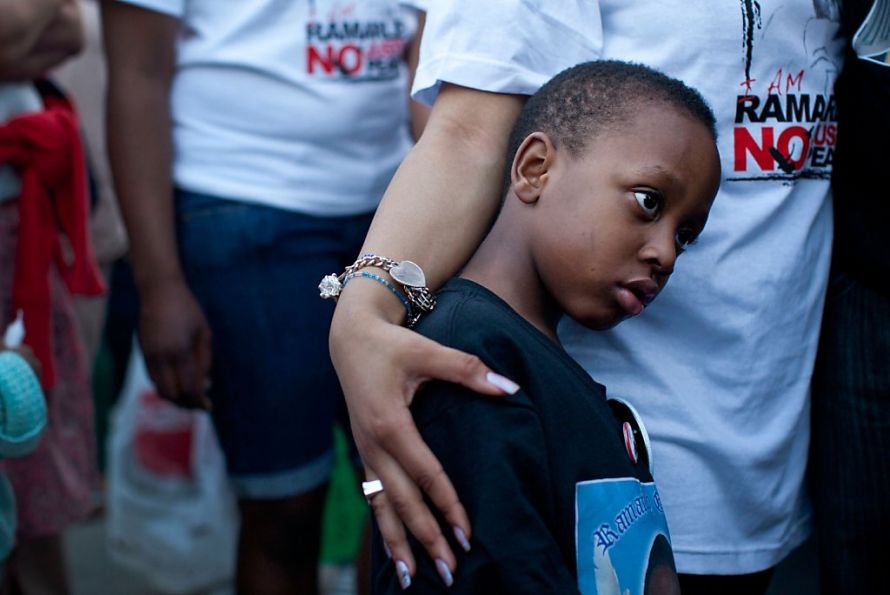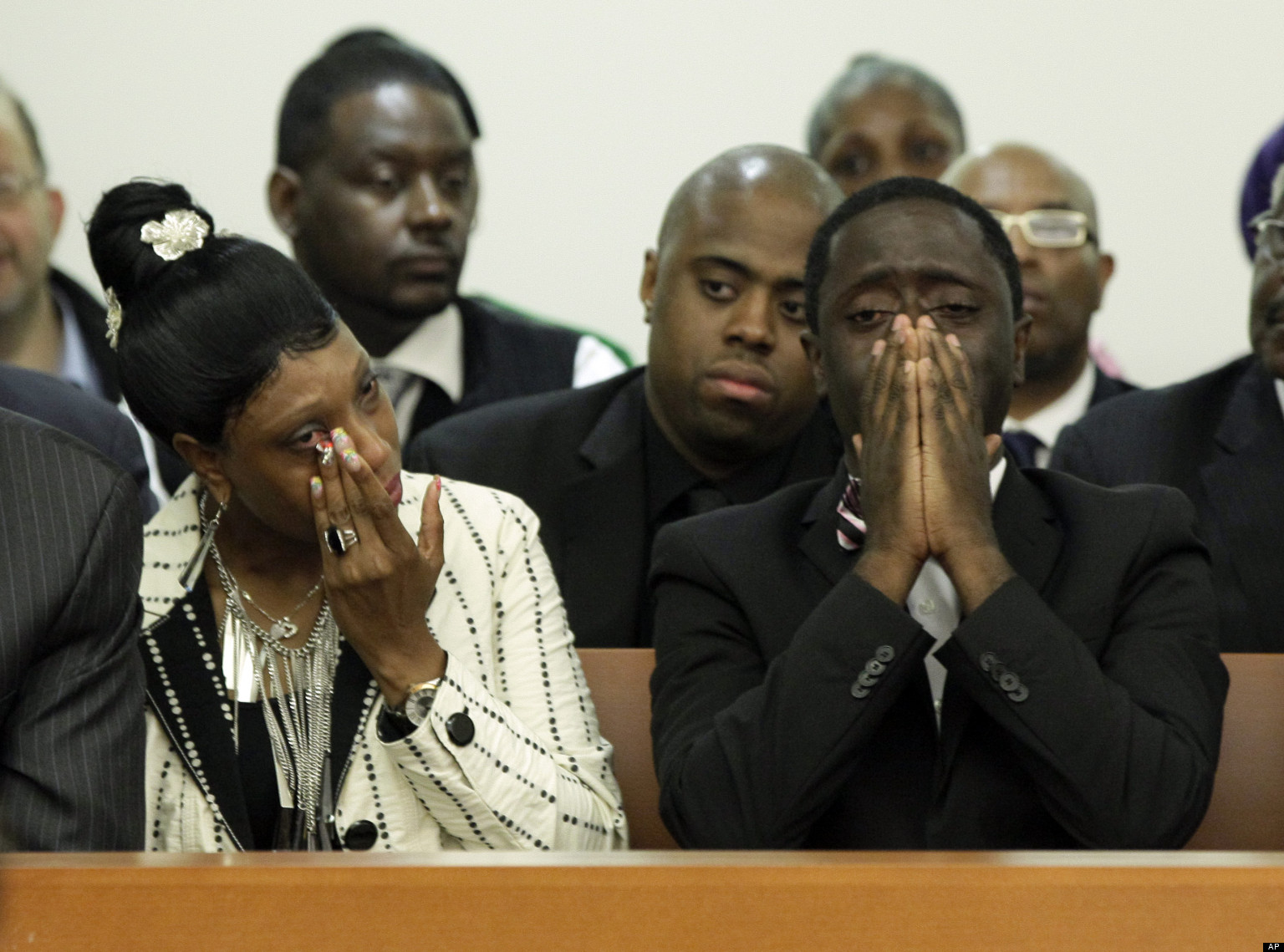THIS ARTICLE ORIGINALLY APPEARED ON ALTER NET

Police officers, security guards, or self-appointed vigilantes extrajudicially killed at least 313 African-Americans in 2012, according to a recent study. This means a black person was killed by a security officer every 28 hours. The report notes that it's possible that the real number could be much higher.
The report, entitled "Operation Ghetto Storm," was conducted by the Malcolm X Grassroots Movement, an antiracist grassroots activist organization. The organization has chapters in Atlanta, Detroit, Fort Worth-Dallas, Jackson, New Orleans, New York City, Oakland, and Washington, D.C. It has a history of organizing campaigns against police brutality and state repression in black and brown communities. Their study's sources included police and media reports along with other publicly available information. Last year, the organization published a similar study showing that a black person is killed by security forces every 36 hours. However, this study did not tell the whole story, as it only looked at shootings from January to June 2012. Their latest study is an update of this.
These killings come on top of other forms of oppression black people face. Mass incarceration of nonwhites is one of them. While African-Americans constitute 13.1% of the nation's population, they make up nearly 40% of the prison population. Even though African-Americans use or sell drugs about the same rate as whites, they are 2.8 to 5.5 times more likely to be arrested for drugs than whites. Black offenders also receive longer sentences compared to whites. Most offenders are in prison for nonviolent drug offenses.
"Operation Ghetto Storm" explains why such killings occur so often. Current practices of institutional racism have roots in the enslavement of black Africans, whose labor was exploited to build the American capitalist economy, and the genocide of Native Americans. The report points out that in order to maintain the systems of racism, colonialism, and capitalist exploitation, the United States maintains a network of "repressive enforcement structures." These structures include the police, FBI, Homeland Security, CIA, Secret Service, prisons, and private security companies, along with mass surveillance and mass incarceration.
The Malcolm X Grassroots Movement is not the only group challenging police violence against African-Americans. The Stop Mass Incarceration Network has been challenging the policy of stop-and-frisk in New York City, in which police officers randomly stop and search individuals for weapons or contraband. African-American and Latino men are disproportionately stopped and harassed by police officers. Most of those stopped (close to 90%) are innocent, according to the New York Civil Liberties Union. Stop Mass Incarceration alsoorganizes against the War on Drugs and inhumane treatment of prisoners.
Along with the rate of extrajudicial killings, the Malcolm X Grassroots Movement report contains other important findings. Of the 313 killed, 124 (40%) were between 22 and 31 years old, 57 (18%) were between 18 and 21 years old, 54 (17%) were between 32 and 41 years old, 32 (10%) were 42 to 51 years old, 25 (8%) were children younger than 18 years old, 18 (6%) were older than 52, and 3 (1%) were of unknown ages.
A significant portion of those killed, 68 people or 22%, suffered from mental health issues and/or were self-medicated. The study says that "[m]any of them might be alive today if community members trained and committed to humane crisis intervention and mental health treatment had been called, rather than the police."
43% of the shootings occurred after an incident of racial profiling. This means police saw a person who looked or behaved "suspiciously" largely because of their skin color and attempted to detain the suspect before killing them. Other times, the shootings occurred during a criminal investigation (24%), after 9-1-1 calls from "emotionally disturbed loved ones" (19%) or because of domestic violence (7%), or innocent people were killed for no reason (7%).
Most of the people killed were not armed. According to the report, 136 people or 44%, had no weapon at all the time they were killed by police officers. Another 27% were deaths in which police claimed the suspect had a gun but there was no corroboration to prove this. In addition, 6 people (2%) were alleged to have possessed knives or similar tools. Those who did, in fact, possess guns or knives were 20% (62 people) and 7% (23 people) of the study, respectively.
The report digs into how police justify their shootings. Most police officers, security guards, or vigilantes who extrajudicially killed black people, about 47% (146 of 313), claimed they "felt threatened", "feared for their life", or "were forced to shoot to protect themselves or others". George Zimmerman, the armed self-appointed neighborhood watchman who killed Trayvon Martin last year, claimed exactly this to justify shooting Martin. Other justifications include suspects fleeing (14%), allegedly driving cars toward officers, allegedly reaching for waistbands or lunging, or allegedly pointing a gun at an officer. Only 13% or 42 people fired a weapon "before or during the officer's arrival".
Police recruitment, training, policies, and overall racism within society conditions police (and many other people) to assume black people are violent to begin with. This leads to police overacting in situations involving African-American suspects. It also explains why so many police claimed the black suspect "looked suspicious" or "thought they had a gun." Johannes Mehserle, the white BART police officer who shot and killed 22-year-old Oscar Grant in January 2009, claimed Grant had a gun, even though Grant was subdued to the ground by other officers.
Of the 313 killings, the report found that 275 of them or 88% were cases of excessive force. Only 8% were not considered excessive as they involved cases were suspects shot at, wounded, or killed a police and/or others. Additionally, 4% were situations were the facts surrounding the killing were "unclear or sparsely reported". The vast majority of the time, police officers, security guards, or armed vigilantes who extrajudicially kill black people escape accountability.
Over the past 70 years, the "repressive enforcement structures" described in the report have been used to "wage a grand strategy of 'domestic' pacification" to maintain the system through endless "containment campaigns" amounting to "perpetual war". According to the report, this perpetual war has been called multiple names — the "Cold War", COINTELPRO, the "War on Drugs, the "War on Gangs", the "War on Crime", and now the "War on Terrorism". This pacification strategy is designed to subjugate oppressed populations and stifle political resistance. In other words, they are wars against domestic marginalized groups. "Extrajudicial killings", says the report, "are clearly an indispensable tool in the United States government's pacification pursuits." It attributes the preponderance of these killings to institutionalized racism and policies within police departments.
Paramilitary police units, known as SWAT (Special Weapons and Tactics) teams, developed in order to quell black riots in major cities, such as Los Angeles and Detroit, during the 1960s and '70s. SWAT teams had major shootouts with militant black and left-wing groups, such as the Black Panther Party and Symbionese Liberation Army (SLA) in 1969 and 1974, respectively. SWAT teams were only used for high-risk situations, until the War on Drugs began in the 1980s. Now they're used in raids — a common military tactic — of suspected drugor non-drug offenders' homes.
The War on Drugs, first declared by President Richard Nixon in 1971, was largely a product of U.S. covert operations. Anti-communist counter-revolutionaries, known as the "Contras", were trained, funded, and largely created by the CIA to overthrow the leftist Sandinista government of Nicaragua during the 1980s. However, the CIA's funding was not enough. Desperate for money, the Contras needed other funding sources to fight their war against the Sandinistas. The additional dollars came from the drug trade. The late investigative journalist Gary Webb, in 1996, wrote a lengthy series of articles for the San Jose Mercury News, entitled "Dark Alliance," detailing how the Contras smuggled cocaine from South America to California's inner cities and used the profits to fund their fight against the Sandinista government. The CIA knew about this but turned a blind eye. The report received a lot of controversy, criticism, and tarnishing of Webb's journalistic career, which would lead him to commit suicide in 2004. However, subsequent reports from Congressional hearings and other journalists corroborated Webb's findings.
Moreover, major banks, such as Wachovia (now part of Wells Fargo) and HSBC have laundered money for drug dealers. Therefore, the very threat that the Drug War claims to eliminate is perpetuated more by the National Security State and Wall Street than by low-level street dealers. But rather than go after the bigger fish, the United States has used the pretext of the "war on drugs" to implement draconian police tactics on marginalized groups, particularly poor black communities.
In 1981, President Ronald Reagan passed the Military Cooperation with Civilian Law Enforcement Agencies Act, which provided civilian police agencies equipment, training, and advising from the military, along with access to military research and facilities. This weakened the line between the military and civilian law enforcement established by the Posse Comitatus Act of 1878, a Reconstruction-era law forbidding military personnel from enforcing domestic laws. Five years later, in 1986, Reagan issued National Security Decision Directive 221, which declared drug trafficking a national security threat to the United States. This militarized the U.S. approach to drugs and overall policing. Additionally, the global war on terror and growth of the National Security State expanded this militarization of domestic policeunder the guise of "fighting terrorism."
The adoption of military tactics, equipment, training, and weapons leads to law enforcement adopting a war-like mentality. They come to view themselves as soldiers fighting against a foreign enemy rather police protecting a community. Nick Pastore, a former Police Chief of New Haven, Connecticut from 1990 to 1997, turned down military equipment that was offered to him. "I turned it all down, because it feeds a mind-set that you're not a police officer serving a community, you're a soldier at war," he told the New York Times. He said "tough-guy cops" in his department pushed for "bigger and more hardware" and "used to say, 'It's a war out there.'" Pastore added, "If you think everyone who uses drugs is the enemy, then you're more likely to declare war on the people." Mix this war-like mentality with already existing societal anti-black racism and the result is deadly. Black people, who, by default, are assumed to be criminals because of their skin color, become the victims of routine police violence.
The fact that a black person is killed by a police officer, security guard, or vigilante every 28 hours (or less) is no random act of nature. It is the inevitable result of institutional racism and militaristic tactics and thinking within America's domestic security apparatus.
The father of a slain black teen in Jacksonville, Florida, is in Geneva this week before the United Nations for what he says are murders committed with impunity against young black men in America.
This time, it’s different.
"We have a right to assemble, a right to freedom. But here we are facing what looks like a military imposing martial law. It is not acceptable."
Posing as an activist watchdog, a tobacco lobbyist seeks to fool voters into adopting pro-corporate positions on the most pressing current economic issues.
The wealth of the most well off people is under-counted because they hide it in tax shelters, keep it in foundations and holding companies, and don’t respond to questionnaires, according to recent research.































































































































































































No comments:
Post a Comment